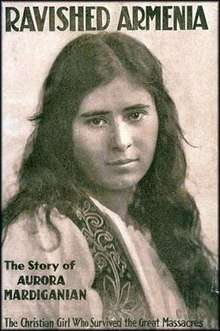Ravished Armenia
 Cover of the book Ravished Armenia | |
| Author | Arshaluys (Aurora) Mardiganian |
|---|---|
| Country | United States |
| Language | English |
| Genre | Autobiography |
Publication date | 1918 |
| Media type | Hardcover |
Ravished Armenia (full title: Ravished Armenia: The Story of Aurora Mardiganian, the Christian Girl, Who Survived the Great Massacres) is a book written in 1918 by Arshaluys (Aurora) Mardiganian about her experiences in the Armenian Genocide.
A Hollywood film based on it was filmed in 1919 under the title Auction of Souls (which also became known as Ravished Armenia, based on the book from which it was adapted). All known complete copies of the film have since been lost, but Mardiganian's account is still in print.[1]
Plot

The author Arshaluys (Aurora) Mardiganian was born in the city of Çemişgezek, near Harput (Kharpert), (present-day Turkish province of Elâzığ), Ottoman Empire. She was the daughter of a wealthy Armenian financier in the city. The story starts in 1915 when Arshaluys was 14 years old. She personally witnessed the murder of her father, mother, brothers and sisters. She was taken to the harem of a number of Turkish pashas, but had remained attached to her Christian Armenian faith despite being tortured repeatedly at the hands of her captors.
She found refuge with Frederick W. MacCallum, a Canadian doctor and missionary stationed with the American Board of Commissioners for Foreign Missions (ABCFM), who safely returned her to Erzurum, which had come under Russian control. She later moved to Tbilisi (Tiflis) in the Caucasus and, through the mediation of General Andranik Ozanian and orders of the Russian military leadership in the Caucasus, was sent to the United States for recovery and to bear witness to the sufferings of the Armenians in the Ottoman Empire.
Aurora Mardiganian, a survivor of the Armenian genocide of 1915–1923, recalled sixteen young Armenian girls being "crucified" by their Ottoman tormentors. The film Auction of Souls (1919), which was based on her book Ravished Armenia, showed the victims nailed to crosses. However, almost 70 years later Mardiganian revealed to film historian Anthony Slide that the scene was inaccurate. She described what was actually an impalement. She stated that "The Turks didn't make their crosses like that. The Turks made little pointed crosses. They took the clothes off the girls. They made them bend down, and after raping them, they made them sit on the pointed wood, through the vagina. That's the way they killed – the Turks. Americans have made it a more civilized way. They can't show such terrible things."[2]
The book was written by journalist Henry Leyford Gates, whose novelist-wife Eleanor Brown Gates became Mardiganian's legal guardian in America.[3]
See also
References
- ↑ Armenian National Institute Review
- ↑ Erish, Andrew A. (2012). Col. William N. Selig, the Man Who Invented Hollywood. University of Texas Press. pp. 211–12. ISBN 978-0-292-74269-7.. See also: Anthony Slide, Ravished Armenia and the Story of Aurora Mardiganian Jackson, Ms.: University Press of Mississippi, 2014, which reprints the original book along with the script of the film and also contains commentary on the film, its distribution and impact and Aurora Mardiganian's comments to Anthony Slide.
- ↑ Bone, James (2016). The Curse of Beauty: The Scandalous and Tragic Life of Audrey Munson, America's First Supermodel. ReganArts.
External links
- Ravished Armenia (film) and Ravished Armenia (book) available for free download at Internet Archive
| Wikisource has original text related to this article: |
| Wikimedia Commons has media related to Ravished Armenia. |